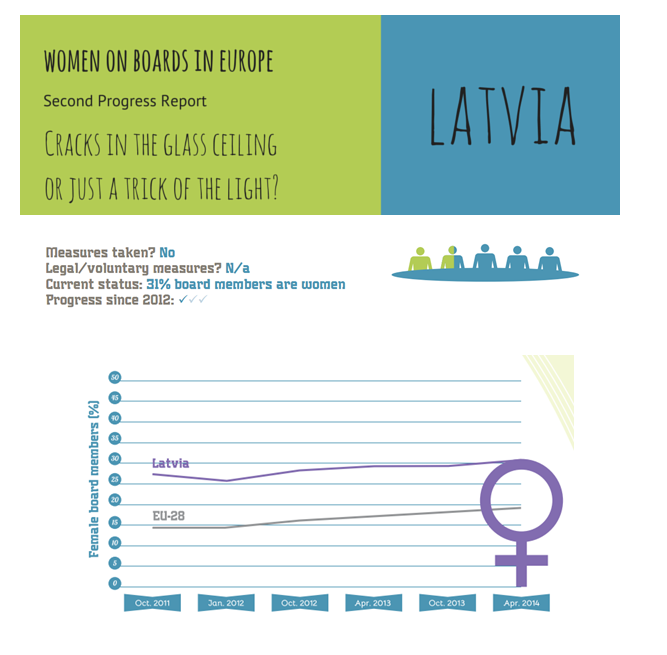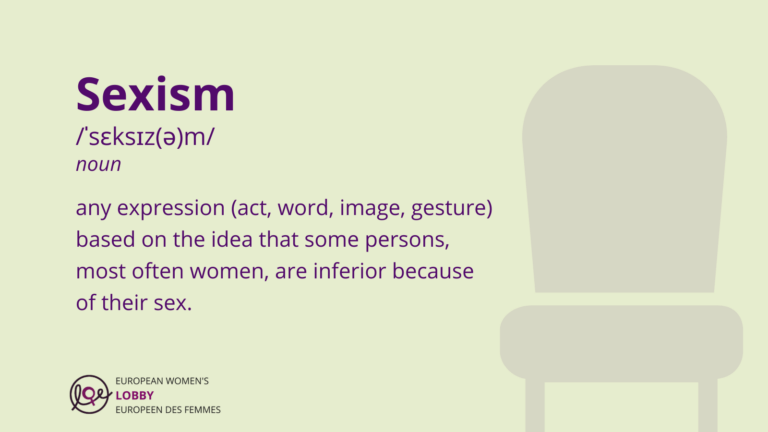What is this report about?
As part of the European Women’s Lobby’s Beijing+20 focus month on ‘Women in Decision-Making’, February sees the launch of the EWL’s latest report on women on boards, entitled ‘Women on Boards in Europe: Second Progress Report. Cracks in the glass ceiling or just a trick of the light?’
This Second Progress Report is part of the EWL’s ongoing work to ensure that parity at all levels of decision-making becomes reality. It tracks developments, progress, and stagnation regarding women on company boards in 11 European countries, including Latvia, since the EWL’s first Progress Report on Women on Boards in 2012 – which was awarded the European Public Affairs Award for Report of the Year 2012.
What’s happening in Europe regarding women on boards?
Since the 2012 report, and ongoing campaigning in favour of binding legislation regarding gender parity on company boards across the EU, an EU Directive which aims to attain a 40% gender balance on non-executive boards in large, publicly listed companies across the EU has been proposed and is currently under consideration by the Council. Commissioner for Gender Equality Věra Jourová has committed to seeing the Directive passed within 2015.
We therefore find ourselves at a key moment to reflect on the developments in this area since 2012 across Europe and to learn from this reflection and analysis in order to best inform current and future policy-making in this area.
What has Latvia done to crack the glass ceiling since 2012?
Positive steps
- Among the EU-28 countries, Latvia has the highest proportion of women on company boards at 31%
- Interestingly, this leading position is maintained in both executive (22%) and non-executive (31%) board seats
- Impressively, these successes have been achieved with neither legal nor voluntary measures to promote women’s participation on boards and in senior management. Some have traced these high levels of women on company boards back to the promotion of women particularly in the service sector in the former Soviet Union, while others indicate that it may be due to the higher levels of education among women or the fact that especially in state-owned companies, politics plays a big role in the selection of board members
Challenges
- While Latvia bucks the trend of an extremely disproportionate concentration of women in non-executive positions, with 22% of executive directorships held by women, there is still a 9 percentage point gap between the proportion of women on executive and non-executive boards.
- Only 3% of CEOs are female despite impressive levels of female board members
- Progress since 2012 has been limited, with a 4% point increase from the Oct 2011 figures
EWL Member Statement
‘It is worrying that the percentage of female CEOs in Latvia is so low, as female CEOs act as role models for junior managers to inspire and encourage them to take steps towards senior management. There has been a lack of mentoring programmes in Latvia, with the exception of the European Successful Women academy launched by the National Coordination in 2012, which attracted a range of mentors including former President of Latvia Vaira Vīķe-Freiberga. A new measure called the Family Friendly Company initiative assesses how companies aid the reconciliation of family and work commitments, such as providing baby-changing and -feeding facilities. This initiative now forms part of the Annual Sustainability Index for companies operating in Latvia. While the proportion of women board members remains high, if no quotas and sanctions are introduced at the national level, there is a risk that this number will drop at some point in the future. For this reason, we call on the government to introduce quotas in economic and political decision-making.’
Edite Kalnina, Women’s NGOs Cooperation Network of Latvia, Latvia
The way forward
The report makes five evidence-based recommendations, which should be taken into account as the future policy landscape regarding women in decision-making at the EU level and the national level is determined:
- Binding measures must apply to both executive and non-executive boards
- Further action is needed to increase proportion of female CEOs
- Effective measures require regular monitoring and intermediary targets
- Measures must be enforced with firm sanctions
- Quotas must be introduced as part of a comprehensive policy package that seeks to address the fundamental causes of women’s underrepresentation in economic decision-making
Gender parity in positions of economic power is of vital importance when it comes to justice, democracy and sustainable growth. Diverse decision-makers and leaders better represent, better understand, and better respond to the desires and needs of women and men in their diversity – and will be more open to cultivating a new style of leadership which will lead to much-needed transformative social change. As an important step forward towards a progressive, sustainable and inclusive Europe, the European Women’s Lobby demands the adoption and implementation of the current proposed EU Directive on women on boards without further delay. Moreover, we strongly encourage national governments to go above and beyond its requirements and to implement stronger measures to achieve gender parity at all levels of decision-making.



